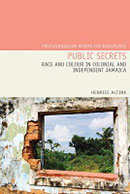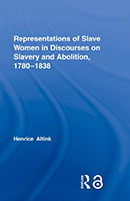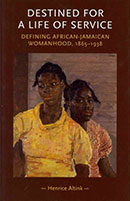Profile
Biography
BA (Zwolle), MA (Nijmegen / Lancaster), PhD (Hull)
Henrice Altink is Professor in Modern History and Co-Director of the Interdisciplinary Global Development Centre (IGDC). She joined the department in 2004. Henrice has been actively involved with the Society for Caribbean Studies (SCS) and the Social History Society for many years and served as deputy editor of Women’s History Review. Henrice’s main research focuses on social inequalities in the Caribbean. She has worked extensively on gender during slavery and in the post-emancipation period.

Her latest book looks at race and colour discrimination in Jamaica from 1918 till 1980. It not only maps the multiple and often covert forms of discrimination in a variety of settings – for example, work, education, and law - but also explores how they were discussed and the extent to which they were contested. Henrice has also worked on the history of medicine and health in the 20th-century Caribbean, in particular mental health, nutrition and TB. Her most recent work examines the intersection between social inequality and environmental vulnerability in the Caribbean.
Research
Overview

Henrice's research focuses on social inequalities in the Caribbean. Her first book Representations of Slave Women in Discourses on Slavery and Abolition, 1780-1838 came out of her PhD and examined representations of Jamaican slave women in pro- and antislavery writings.

Her second book Destined for a Life of Service: Defining African Jamaican Womanhood, 1865-1938 also explores race's intersection with gender. Drawing upon a wide range of primary materials, including court testimonies, folk tales, and oral history, it looks at the lives of the second-generation of African-Jamaican women born in freedom, in particular their engagement with messages about marriage, motherhood, sexuality, work and citizenship.
Supported by a British Academy grant, her most recent book Public Secrets: Race and Colour in colonial and independent Jamaica (2019) looks at racial discrimination in Jamaica in the era of decolonisation (1918-1980). It not only maps the various forms of race and colour discrimination but also how race was talked about and the role that African Jamaicans themselves played in upholding hierarchies of race and colour. And it includes a chapter that assess the role of race and colour in present-day Jamaica and sets out some suggestions to create a more equal and just society.
Funded by, among others, the Global Challenges Research Fund (GCRF) and the Rockefeller Foundation, she has also published several articles on health and medicine in Jamaica, including:
- Fight TB with BCG: Mass vaccinations in the British Caribbean, 1951-56’, Medical History vol. 58, no. 4 (2014), pp. 475-97.
- ‘“A black scourge”?: Race and the Rockefeller’s tuberculosis commission in Interwar Jamaica’, História, Ciências, Saúde - Manguinhos (History, Sciences, Health- Manguinho)s, vol. 24, no. 4 (2017), pp. 1071-87.
- ‘Tackling child malnutrition in Jamaica, 1962-2020’, Humanities and Social Sciences Communications 7, 50 (2020),
- With Sarah Masefield, Alice Megaw, Matthew Barlow, Jean Grugel and Piran White, ‘Repurposing NGO data for better research outcomes: A scoping review of secondary data in health policy and system research’, Health Research Policy and Systems 18, 63 (2020)
Her most recent work focusses on the intersection between social inequalities (race, ethnicity, class, gender, age, and sexuality) and environmental vulnerability in the Caribbean since WWII. She has led a GCRF-funded research network on risk and resilience in the coastal Caribbean and has been a Co-Investigator on several funded projects on environmental resilience in the Caribbean and Latin America. This new research has resulted in, among others, the following publications:
Henrice is also co-director of York’s Interdisciplinary Global Development Centre. Set up in 2017, this interdisciplinary centre for research, teaching and partnership for global development is led by the Departments of Politics, Environment and Geography, and History and works across and beyond the University to collaborate with partners worldwide to create new interdisciplinary and innovative approaches to tackle global challenges.
Supervision
Henrice Altink would welcome inquiries from those interested in postgraduate research into the modern history of the Caribbean. She particularly welcomes proposals that examine the process and/or impact of decolonisation. Those with an interest in the migration of Caribbean people to the UK are also encouraged to contact her.
Selection of MA dissertations supervised:
- Education in post-war Trinidad
- The 1937 labour riots in Trinidad
- The (lack of) modernisation in the Jamaican sugar industry, 1880-1918.
- Land settlement schemes in Jamaica, 1895-97.
- The Windrush on screen
- Difficult histories on film
Resources available for research students in York
The J.B. Morrell library provides an excellent starting point for the history of the British Caribbean. Besides surveys of Caribbean history and (e-)monographs on Caribbean history, it contains parliamentary papers which provide a wealth of information on the British Caribbean during both slavery and freedom. Various libraries and archives in London also hold information relating to the British Caribbean, including the British Library, the Institute of Commonwealth Studies, and The National Archives. In recent years, several Caribbean newspapers have put their archives online, such as the Jamaican Gleaner which goes back to 1834. And the still growing Digital Library of the Caribbean also holds some newspapers such as Abeng, a Black Power Movement paper, as well as a host of other relevant visual and textual sources. Henrice Altink has used the national archives and libraries in Jamaica, Barbados and Trinidad and the archival collection of the University of the West Indies and can provide you with contacts at these institutions. She also has extensive experience in the use of secondary data from such organisations as the World Bank, Inter-American Development Bank (IDB), Organisation of American States (OAS), and the Economic Commission for Latin America and the Caribbean (ECLAC).
Teaching
Undergraduate
An example of modules taught:
- HIS00151I Black Radicalism
- HIS00157H From Colonial to Post-colonial States? The Twentieth-Century Caribbean
Postgraduate
An example of modules taught:





